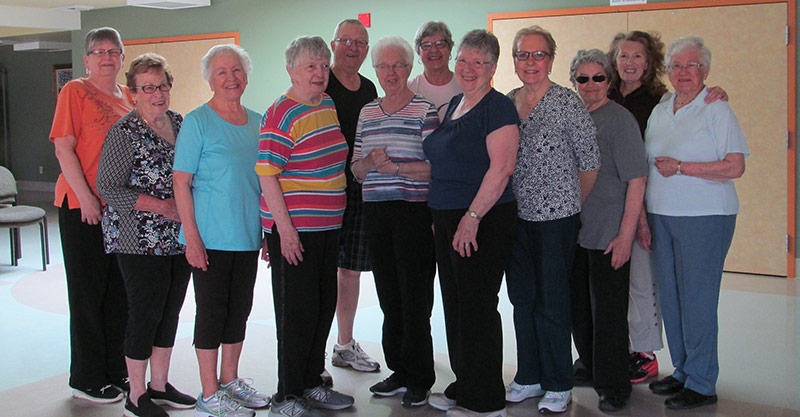UNB researchers release preliminary results of fall prevention program
Author: UNB Newsroom
Posted on Dec 3, 2019
Category: UNB Fredericton

Preliminary results from a fall prevention program for people age 50 and up show participants had increased benefits associated with a decreased risk of falls.
Drs. Danielle Bouchard and Martin Sénéchal, co-directors of the University of New Brunswick’s Cardiometabolic Exercise & Lifestyle Laboratory (CELLab), presented preliminary research results for Zoomers on the Go, a collaborative study that includes fall prevention education and an exercise program for people 50 years and older, at the Canadian Association on Gerontology annual conference.
This program was initiated in 2012 by Horizon Health Network and was recently studied by professors in UNB Fredericton’s faculty of kinesiology (Drs. Bouchard, Sénéchal and Charlene Shannon-McCallum) and department of psychology (Dr. Janine Olthuis), as well as Université de Moncton’s faculties of education and kinesiology, with funding from the New Brunswick Health Research Foundation and the wellness branch of the Province of New Brunswick. Since then, other key partners have become involved, such as Vitalité Health Network, Fitness New Brunswick and NB Trauma Program.
Zoomers on the Go is a free 12-week exercise program offered in French and English. It aims to help aging adults meet current physical activity guidelines by offering two 60-minute volunteer, peer-led sessions per week involving aerobic and resistance exercises, flexibility and balance activities.
One of the main goals of the study is to scientifically test the pre- and post-benefits of the program. To do so, Zoomers on the Go participants from seven locations across Fredericton were put into two groups – those who participated in the exercise program and those that didn’t. The research team was interested in observing whether the Zoomers on the Go participants were less likely to fall, visit their physician, be hospitalized or be institutionalized.
At the beginning of each session, each participant had to wear a pedometer for seven days and then have their blood analyzed and body composition measured. They were also evaluated for various physical functions, including balance tests, sit-to-stand, arm curl, back scratch, grip strength, timed up and go (TUG), single leg-stance and six-minute walk.
Participants also filled out questionnaires that measured depression and anxiety, sedentary behaviour, exercise patterns, leisure activities and self-perceived health. Some of them also participated in semi-structured interviews aiming to understand the goals of participating in a community-based program.
At the end of the program, both groups were re-measured. The researchers observed that the majority of participants of the study had increased psychological and functional benefits – enough to be associated with a decreased risk of falls.
“What’s unique about Zoomers on the Go is the fact that it’s a free peer-led program that doesn’t need specialized equipment,” says Dr. Bouchard. “Two key questions were considered in the design of this program: Is it sustainable and is it cost-effective? It is not about what we can do in 12 weeks, but what can be sustained over a longer period of time in each location.”
“Horizon and Vitalité are key partners that keep this program alive,” she says. “We are now seeking funding to spread the program across the province and hoping to test the long-term benefits of Zoomers on the Go.”
Anyone interested in becoming a leader for their peers or participating in any region of the province should contact the CELLAB at cellab@unb.ca or call (506) 458-7034.
Media contact: Angie Deveau
Photo credit: Jane Stewart
